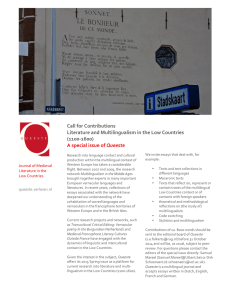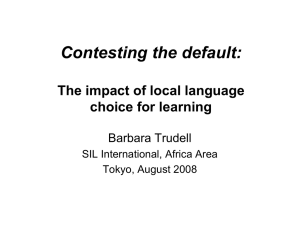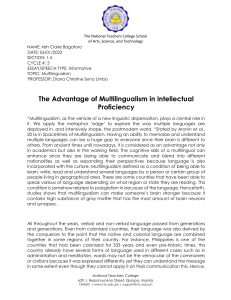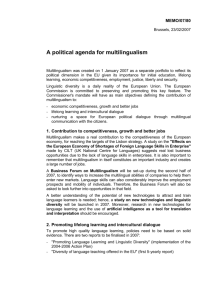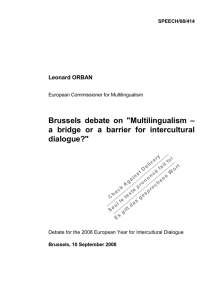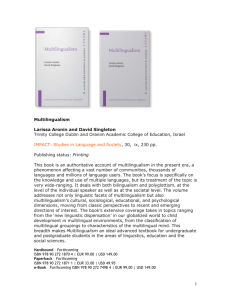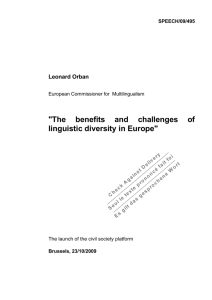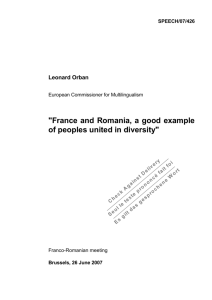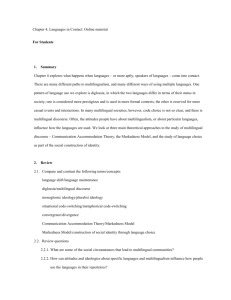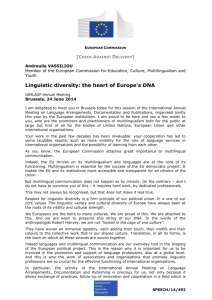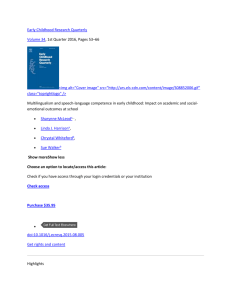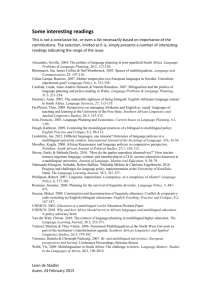DOC - Europa
advertisement
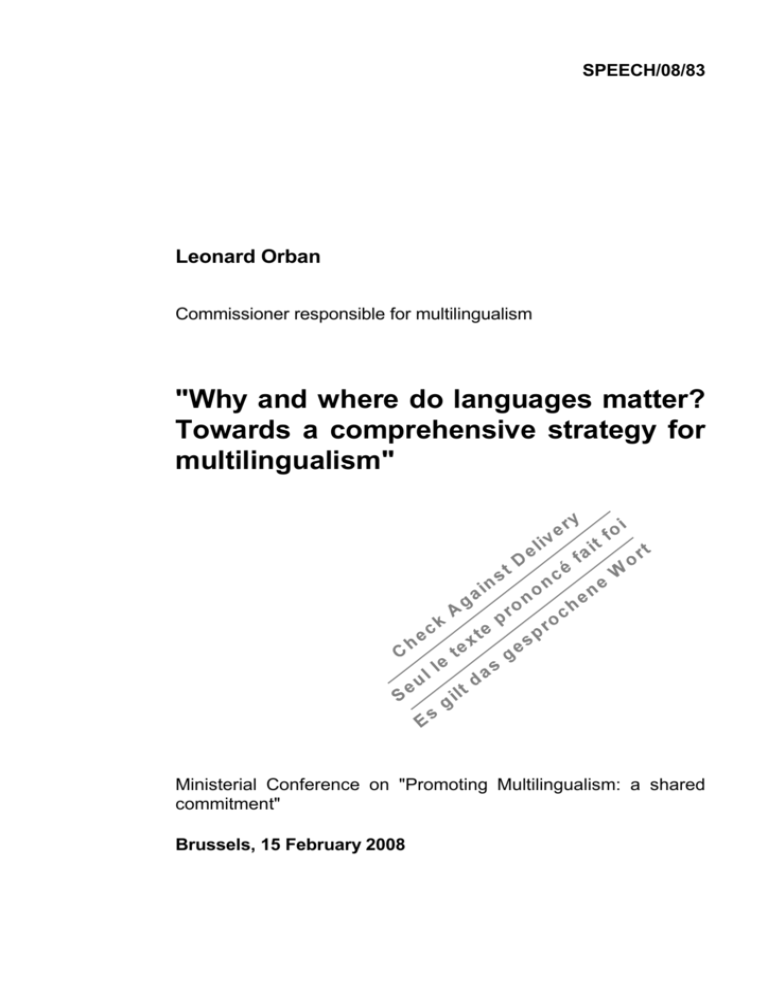
SPEECH/08/83 Leonard Orban Commissioner responsible for multilingualism "Why and where do languages matter? Towards a comprehensive strategy for multilingualism" Ministerial Conference on "Promoting Multilingualism: a shared commitment" Brussels, 15 February 2008 Dear colleagues, ladies and gentlemen, Minister Zver, thank you, Mrs Batzeli, thank you for bringing us Parliament's views on languages and helping us frame our work. Before welcoming our other speakers, I want to reflect briefly on the question I consider holds the key to the multi-layered issue of languages in today's Europe: Why and where do languages matter for Europe? The answer is written on the foundation stone of the Union: in our shared determination to create a Europe where our citizens live peacefully and in prosperity together. We can look at the entire process of European integration as a sequence of steps, big and small, bringing citizens closer to each other: free movement of workers, of students and families; the internal market; creating a European space for education, research and innovation; enlargements to the west, the south, the north, the east *** The result? European citizens are now more mobile than ever, able to plan their lives and careers on a European scale. If we add to this picture the migration flows from third countries and the effects of globalisation, we easily grasp why our societies are becoming more multilingual, on an everyday basis. Not only in smaller countries, in border regions, or where minorities live: in every street in Europe, in cities and in villages, you can hear several languages spoken; and this trend will continue. 50 years ago, Europe concentrated hard on rebuilding – physically, and politically. We have still not finished. Today, we must build a Europe that can respond flexibly, imaginatively and effectively to an era of knowledge. To a world of rapid communication, of multiple communities, and – most challengingly, where we must work hard to close the skills and innovation gap with our competitors. Investment in skills and skills upgrading are crucial factors for growth and jobs, and language skills are a crucial part of the deal. *** Let me reformulate my question: What can we do so that our citizens can take advantage of the European space we have created? What can we do to make languages a bridge and not a barrier in our immediate environment? First, enabling our citizens to take advantage of the European space: Surveys show that lack of adequate language skills is the main obstacle which holds citizens back from planning a career abroad. It stands in the way of workers and their families alike. We share the task of equipping citizens with adequate language skills when they come out of initial education and through their lives. Language teaching in initial education has improved, but more remains to be done in a lifelong learning perspective. Moreover, we cannot content ourselves any longer with the comfortable thought that English is enough. It is not. As Heads of state and government acknowledged in Barcelona 6 years ago, where they committed to teach 'mother tongue + 2' from an early age. That commitment has been met remarkably well for early language learning. Nearly all Member States have introduced a second language in early primary education. 2 Unfortunately the other part of the commitment - teaching two languages - doesn't look so promising. We will have the language indicator, to test the skills of our teenagers. Nevertheless we should be aware that it relies first on the languages made available in the curricula. The richness of Europe's linguistic heritage is such that no language should be recommended more than another: citizens should be able to choose according to their interests, the place they live or their family background. These languages will be different for each of you and will vary greatly for our citizens too. The real challenge is to enable people to build a language path by offering a palette of languages in our educational systems. Tackling languages in initial education is the right place to start. But most people are no longer in initial education. They need languages, and they need them now. Some examples – we all know them: - specialised workers – plumbers, masons, technicians, nurses, coming out of vocational education where languages get little attention, but wanting to move abroad for job opportunities (or who may need languages in their professional life); - employees and professional people needing languages for their careers but without access to learning opportunities; - Older people who want to move abroad for holidays and longer periods, or to communicate with their grand-children speaking other languages … And now the hardest to reach: unemployed people, those with only basic qualifications or coming from disadvantaged communities. Usually with poor school records… how do we cater for them? We are used to hearing about the "digital divide" - the new cleavage between those with access to new technologies and those without. Now we should beware the "languages divide": the cleavage between those who speak more languages and can reap the benefits of the European space and globalization, and those who cannot. Lifelong learning – lifelong language learning - is the magic formula. But it demands a great deal of creativity, flexibility and commitment. *** I come now to my second question: What can we do to make languages a bridge and not a barrier in the immediate environment citizens live in? In recent years, our neighbourhoods, our schools and workplaces have started to buzz with more and more people from different backgrounds, often speaking different languages. Our societies are becoming multicultural. But sometimes diversity is seen as a threat and communities live in isolation, triggering xenophobia. We must evolve into an intercultural society, where citizens of different backgrounds share a dialogue. And for dialogue, we need languages! We have a responsibility. We must help unveil the potential of languages in our communities – we must let down the drawbridge, turn the barrier into a bridge. I am fully aware of the challenge this poses for us all: our societies should function in such a way that we assume we will be living together with foreigners and migrants. We should assume that there are people who speak other languages and may need some help – and may have something to offer in return. 3 Small actions can fix large problems – and we have many examples in different Member States: announcements and instructions in several languages in public services, transport, hospitals, police, schools, courts, etc. A network of local "interpreters" and cultural mediators to call on…. We should never stop repeating that learning the language of the host country is the key to integration. At the same time, we should value the other languages that are brought to our communities. For instance, if only having a different mother tongue was seen, not as a problem, but as a chance to grow up bilingual! If citizens living side-by-side could interact around their different cultures and languages, the social web would become stronger and more steeped in tolerance and respect. Colleagues, multilingualism goes far beyond education: it is enmeshed in the daily lives of citizens and companies. The next speakers will show us just how much languages affect the economy and culture. Our discussions should cast their nets wide and seize the new challenges! This afternoon, we will be firmly grounded in reality: our discussions will be preceded by a presentation from multilingual Slovenia and an overview of the main messages and recommendations from the consultation process – what citizens and stakeholders want! Then it will be time for us to put forward our suggestions and commitments for promoting multilingualism. Our exchange of views in November made clear that we share a number of challenges: We heard expectations about action for multilingualism for jobs and competitiveness; for citizenship and intercultural dialogue. Many of you raised key issues of lifelong learning policies, such as improving teacher training, vocational training and adult education. I am sure that themes for common work and shared commitments will arise naturally from our discussion; that we will join forces and work together towards solutions. 4
